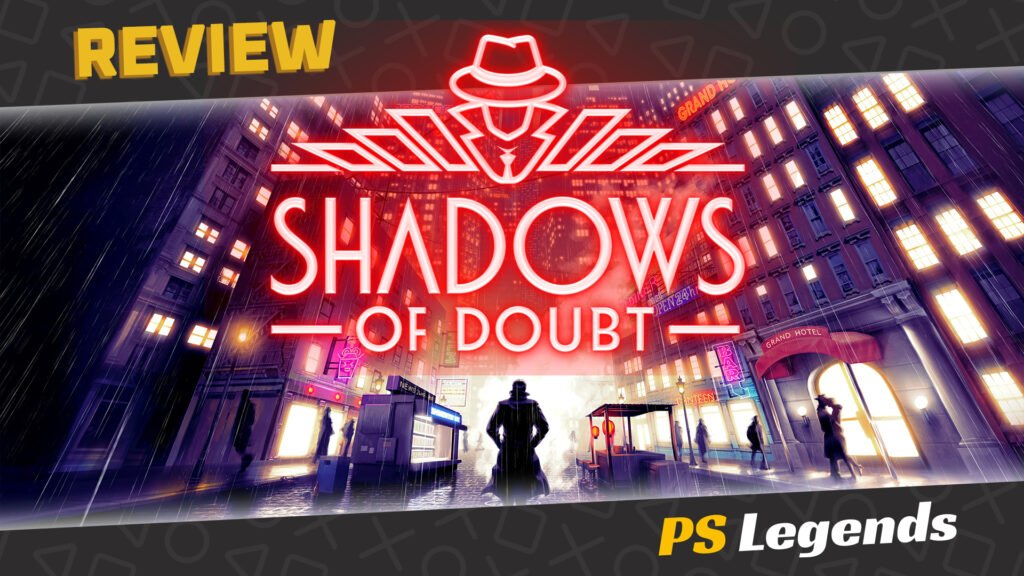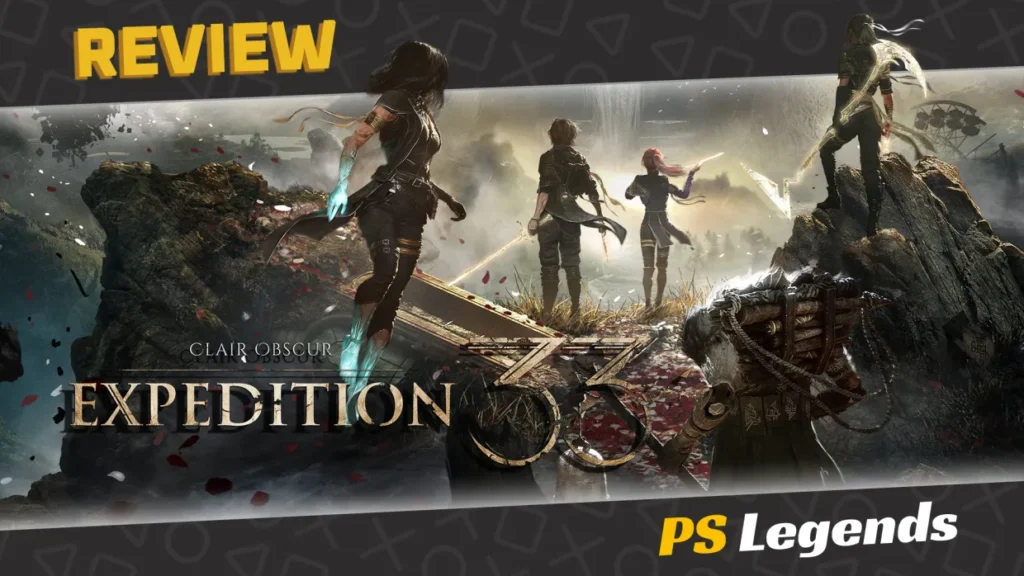I’m surprised a title as ambitious as Shadows of Doubt slipped under my radar for as long as it did, particularly because it was available in early access on Steam over a year ago. Even the iconic Yahtzee Croshaw was singing its praise a while back, and rightly so. It’s a unique and captivating experience. Let’s dive in and see how the additional seventeen months of bug-fixes, refinements and overall polishing have improved the game, as it makes its PS5 debut.
On This Page
Introduction
Shadows of Doubt is a first-person detective stealth puzzle-adventure game developed by British developer ColePowered Games and published by Fireshine Games. It was released in early access on 24th April 2023 for Microsoft Windows. Upon its early access release, Shadows of Doubt received very mixed reviews, with critics praising the innovative potential of the game’s open-ended, player-directed design, whilst critiquing its repetitive elements and multiple bugs. The updated PS5 version of the game released on 26th September 2024.
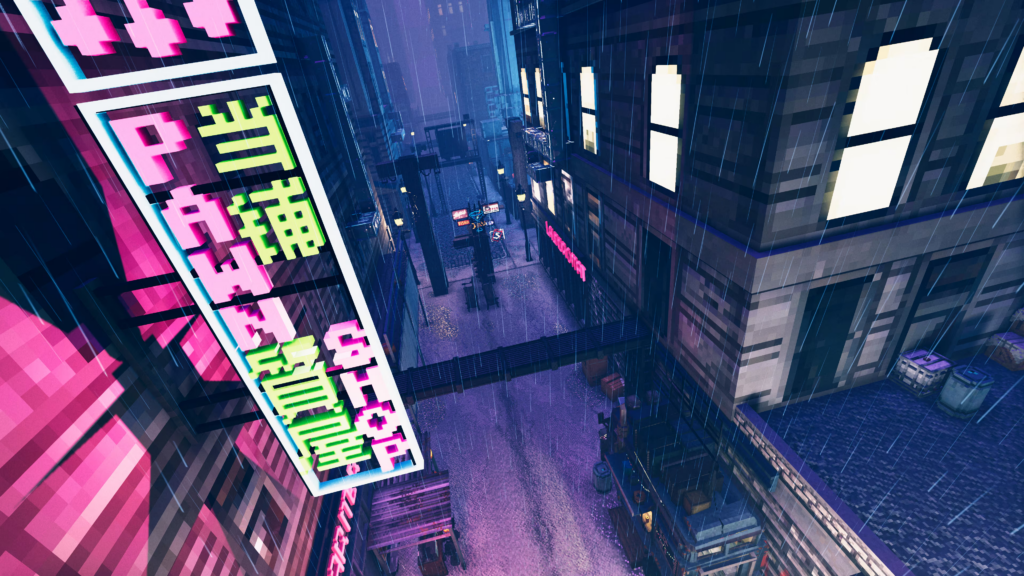
Story
Shadows of Doubt takes place in an alternate history that diverges from the real world in the year 1610. Henry IV of France is not assassinated, allowing English inventor William Lee’s knitting machine to spur an early industrial revolution in France. Consequently, the Jacobite rising of 1745 prevails in England, and Charles Edward Stuart is crowned King Charles III, leading to lasting peace between the two countries and the subsequent formation of an Anglo-French Empire under Louis XVI, which in turn quells the American Revolution in 1776.
The Empire is torn apart by rebellions during the Mustard War from 1891 to 1901, and then re-organised into the democratic United Atlantic States in 1902, which enshrines corporate personhood into law in order to rebuild its economy. In 1965, Starch Kola, the world’s oldest megacorporation, is elected President of the UAS and replaces local police forces with the privatised Starch Kola Enforcers.
The game begins in 1979, and the player is a citizen of the UAS. Due to hyper-industrialisation, radioactive fallout from the Mustard War, and rising sea levels caused by global warming, most people live and work in cramped, smog-shrouded cities isolated by toxic water. Every UAS citizen dreams of attaining the lofty social credit score necessary to retire to The Fields, an exclusive district located in one of the world’s last unsullied regions.
As a former police officer, the player has the skills and tools to take on freelance investigation work. Since the Enforcers are spread thin, willing citizens are permitted to investigate murders, catalog evidence, and arrest criminals in exchange for cash and social credit score promotions; The catch is that successfully solving a murder as a freelancer often involves breaking the law yourself in order to make progress.

Gameplay
Shadows of Doubt is an open-world detective investigation game played from a first-person perspective. The player works as a private investigator who pursues murder and other crime cases in a city. The city’s layout, citizens, routines, and all murder cases are procedurally-generated per save file, and the player can choose their city’s name and size. The player has access to police transmissions and is alerted whenever a murder is reported, allowing them to open a case.
The player’s overarching goal is to increase their social credit score by solving murder cases. Reaching the maximum social credit score enables the player to leave their city and enter retirement, concluding the game. Meanwhile, money earned from murder cases and various odd jobs is needed to purchase certain investigation tools, rent and furnish an apartment, pay for medical care when injured, pay off fines, and bribe citizens for information or access to restricted areas.
The details of each murder case are randomly configured; murders may occur anywhere and at any time, any citizen can be involved, the crime can be carried out through a variety of lethal methods, and the available forensic evidence can include fingerprints, surveillance camera footage, witness observations, and other evidence and details. The player also has to contend with false leads, time-sensitive evidence, anti-intrusion security measures ranging from locked doors to automated turrets, and hostile responses from citizens who catch the player doing anything illegal.
The player can complete a murder case by submitting a case resolution form to the local city hall. The form has five fields: the suspect’s full name, their address, a piece of evidence placing the suspect at the crime scene, the murder weapon, and whether the suspect has been placed under arrest. Only the murderer’s name is required for a successful submission, but a cash bonus is rewarded for each optional field that is correctly filled out. If the player accuses the wrong person, they will be fined and the real murderer will continue killing. Sometime after a murder case is solved, the game will automatically select another citizen to carry out the next string of murders, unlocking your next case.
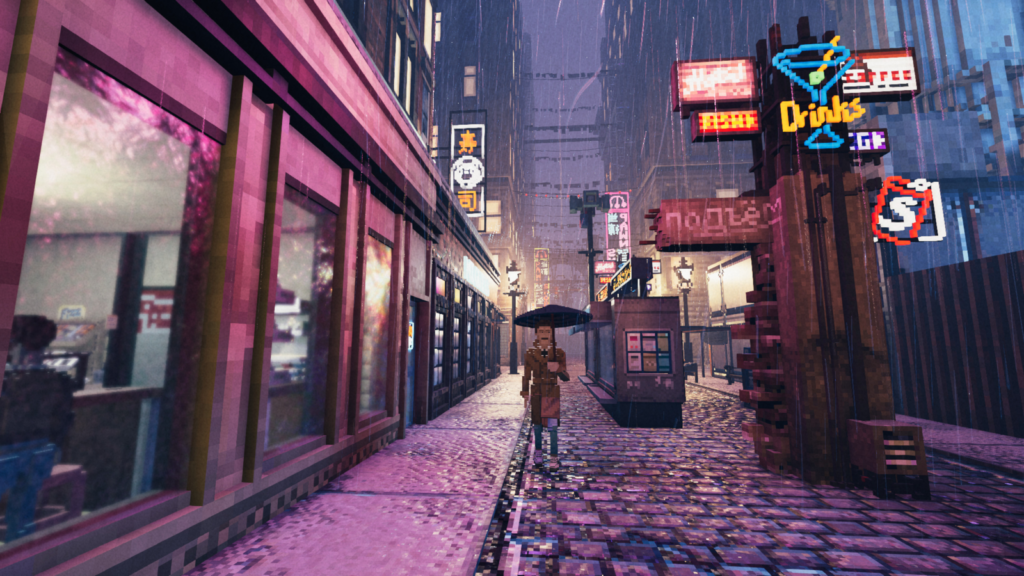
Graphics/Sound
There’s a cubic, Minecraft-like aesthetic throughout, also known as ‘Voxel Art’. This has pros and cons. The outdoor environments generally work incredibly well utilising the visual style to provide a tile-like surface which is perfect for stone roads, bricks, boxes and lights. In motion, it also brings with it a familiar, PS2-era grain which emphasises the gritty streets and smog-filled skies.
Where the presentation falls flat is with character models, which are the very backbone of the game. To be blunt, everyone looks hideous from start to finish, devoid of facial details and readable expressions while body motions are janky and unrealistic. It’s not pretty, and since interviewing suspects and questioning passersby will make up much of your investigation, this is something you’ll need to make your peace with, and fast.
Fortunately, the music is excellent, with a synthy-cyberpunk noir-style that fits everything you’re experiencing and feels suitably ominous throughout. There’s no voice acting, but most of the dialogue is repeated every time you interact with someone anyway so the addition of voices probably wouldn’t be of much benefit to the game.
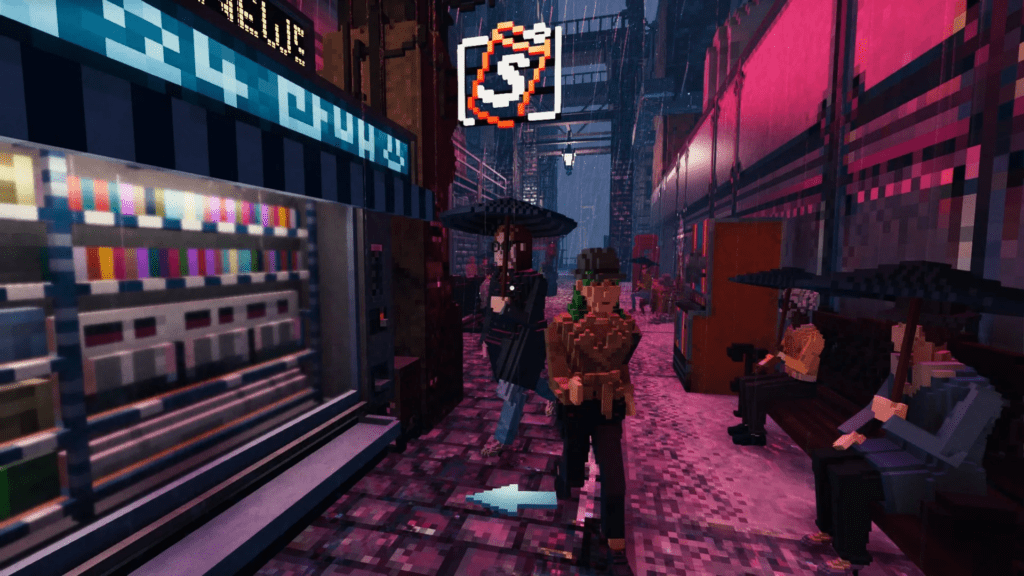
Conclusion
Shadows of Doubt is a fascinating concept, with simple yet incredibly versatile gameplay which make those first few hours absolutely magical, even if you do need to push yourself to look past the visuals. It’s easy and addictive to get invested in the game’s charming world, however the cracks start to show after a few more hours of cases that start feeling increasingly familiar and predictable after a while. The idea of procedurally-generated cities and cases makes you think that the possibilities are endless, but instead this leads to very repetitive locations, actions and conversations.
Once you do a few cases, you pretty much only need a couple of names and fingerprints and the case is closed. It’s a shame because the game gives you a lot of intel that makes you string up a whole story of cheating, lies and deceit. After reading through emails, looking at which books a suspect owns, why they need certain medications, etc, you’ll eventually realise that you’re reading too much into things. A lot of those pieces of intel you find are repeated throughout all the cases and have no use or relevance.
As much as the game tries to imprint a life, a role, a personality and a routine onto each person, the identity and individuality of the suspect are soon feel unimportant, like you’re chasing a lifeless, copy-pasted NPC. The game has all these cool ideas of needing to sneak into places, use air vents and cabinets to hide, and monitor your noise levels, yet the stakes aren’t high enough for you to go through all that effort. If anyone finds you, just have a weapon handy and you can incapacitate them in one hit without any repercussions.
These low stakes also allow each case to be solved with little to no effort. Use the evidence at each crime scene to narrow down your suspects, then find someone who could potentially be the killer and handcuff them, tell them you’re arresting them, and they will either confess to the crime or protest their innocence which they never seem to be able to lie about. They also carry the murder weapon on them at all times so searching their place for any evidence other than fingerprints is pointless. This is usually a sound strategy anyway since some crime scenes fail to generate any noteworthy evidence anyway, which is potentially the remnant of an old bug still present.
I’m being very hard on the game, but in truth, I love the concept, the atmosphere, the gameplay, the element of tension in survival, and the addictive nature. The game is immensely entertaining for a good few hours, but the crucial focus of the game is its cases, and these really need to take advantage of the endless possibilities with procedural generation without feeling so familiar and similar in their solution strategies. It’s easy to see how much fine-tuning has gone into the game from its buggy early-access origins, but there’s still room for improvement here.
Joys
- Highly accessible, with multiple options available to solve crimes.
- Atmospheric city with stunning music.
- Nice, simple interface.
Cons
- Visual style won’t be to everyone’s tastes.
- Can get very repetitive after a while.
- Still some minor bugs floating around.
